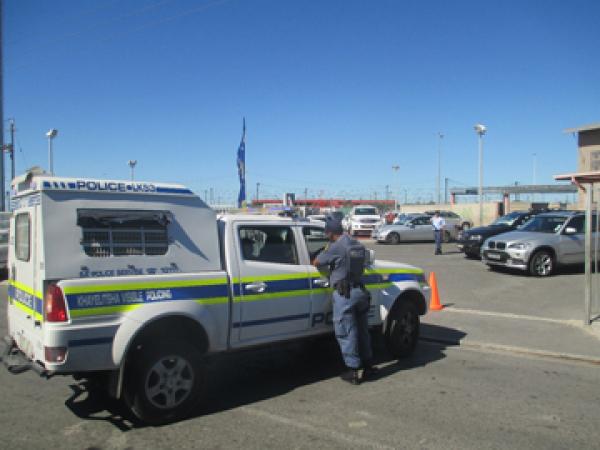

Khayelitsha Visible Police outside the Andile Mzisi Hall in Khayelitsha, Site B. Photo by Adam Armstrong.
25 March 2014
On March 25, Brigadier Leon Rabie told the Commission of Inquiry into Policing that if the proposed second station in Harare, Khayelitsha, went ahead, the SAPS would be “robbing Peter to pay Paul”.
Brigadier Rabie is the Section Head of Performance Measurement based in the Human Resources Management Division at the SAPS offices in Pretoria. His office is responsible for calculating the theoretical requirement for each police station and for the support services within SAPS.
Rabie stated in evidence that there are 1137 police stations in the country. Between 60% and 65% of SAPS’s total budget is used to operate these police stations.
The SAPS grew from 120 000 members to 200 000 members between 2002 and 2012. In 2012, National Treasury decided that the SAPS budget would not increase and that SAPS must stabilise at its current size.
Rabie explained that the theoretical requirement is based on a number of factors, such as the population in an area, the crime rate, the area to be policed, and so forth. Once the theoretical requirement is calculated, this is handed over to the finance department who are responsible for allocating posts to individual stations. The actual allocation of resources is roughly 33% lower than what has been calculated as the theoretical requirement.
Therefore SAPS operates with roughly 33% less than what it needs.
The creation of a second police station in Harare has been touted as a solution to crime in Khayelitsha. However, Rabie said given the current context of SAPS not being permitted to grow in size, the creation of a second police station in Makhaza would probably not be an effective solution. Creating a second station in Harare would involve splitting the Harare policing precinct, and sharing the existing resources between the two stations. Rabie explained that this may result in a less efficient resource use.
“We would be robbing Peter to pay Paul,” said the brigadier. The number of officers available in Harare would be slightly higher, though the rank of the station commander, and the rank of the station, would be lower.
He said creating a service centre in Makhaza would be a better option than another police station. It was also within the powers of the Provincial Commissioner to move officers and resources between stations or policing precincts within the Western Cape. However, he did not see this as necessarily viable, as he explained each station required a significant number of officers to operate a 24-hour customer service centre.